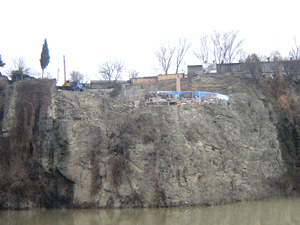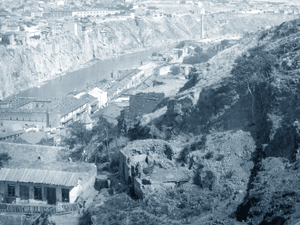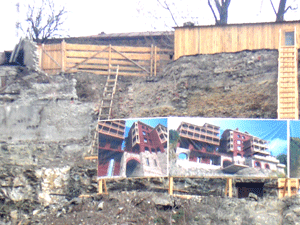 Eka Kevanishvili, Tbilisi
Eka Kevanishvili, Tbilisi
The rock cliffs are as much as anything else to the Tbilisi Landscape. Old hotels and houses are erected on the heights above the Mtkvari River that cuts Tbilisi in two. A new construction is being carried out on the plot in Mukuzani Street # 7: Besarion Khvinteliani, a Georgian businessman who works in Russia is constructing a new hotel. At first impression, you might think that everything is in order, just another hotel among many.
The property owner legally purchased the land and based on the architectural plans, a hotel project has been approved and is now in progress. However, Metekhi Rock, so called “Brovka” is now seriously damaged, as air hammers chisel away the sheer rock. This solid rock would otherwise be a solid foundation. It goes without saying that the natural beauty of the rock cliff above the river is being destroyed. Natural beauty aside, that of the rock base, it is difficult to say what will be the impact of taking a cut from solid rock on the structural integrity of other buildings, and what will be the impact on other buildings and the neighborhood. That is something that only engineers and time will be the judge.
The City Hall states that Metekhi Rock – “City Balcony” as architects refer to it, has not been damaged. However, when one looks up from the river Mtkvari embankment, the scenery is a complete disaster to the eye. Most would agree and this begs the question how can this happen and how in open sight a side of a cliff has been removed without any public outcry. In the meantime, the process continues as the rock cliff is being removed piece by piece; the heck with public opinion and the consequences of unabated and unregulated construction.
It comes as no surprise that many seemingly worthless constructing projects have been approved for old Tbilisi districts, especially for those parts of the city where there are many historic buildings and places that are declared as cultural heritage. It seems that nobody appeared to be so strong to oppose this process though two boards were involved in the decision making process - the City Hall board and the board of the Ministry of Culture.
Nika Vacheishvili, present Minister of Culture was the head of the Ministry board. There have been instances when he overrode projects and used his veto to stop projects that had been approved by the board of the Tbilisi City Hall. Later these two boards were united and it is now called “United” board. The board works in the City Hall. Only two people were moved to the new board from the Ministry board. The architects, the majority of them comment without specifying their identity and say that the system when the construction projects had been discussed by two boards should not have been changed as now as a result of this change Gigi Ugulava, Tbilisi Mayor has become more influential in his standing. Aleksandre Elisashvili, journalist and head of Tbilisis Hamkari agrees with the architects. On March 5 he expressed his protest against the construction on Metekhi Rock and said that Tariel Oniani, notorious international criminal had his interests in the hotel construction project, which would imply that something was less than proper and above board.
The media sources expressed an interest towards the construction only because Tariel Oniani was somehow implicated, directly or indirectly. Of course, Tariel Oniani’s name is not mentioned in any of the official documents, but Elisashvili alleges that he checked the information with three different sources, including the City Hall and received confirmation from them, as to the nexus. Oniani’s involvement is interesting as far as “ordinary” people, that is people with no influence would not have access to the construction on a protected area of a town. It would be a great scandal if some common person would have damaged the natural scenery in such a harsh and unforgiving way. A common person would have been severely punished, even perhaps sent to jail. But it is more important to find out why the rock was broken out so gravely and just why the project that had been disliked by the majority of board, received approval in the end.
 Aleksandre Elisashvili: “It is not so important who actually owns the real estate. Consideration should be taken of two laws on the books: The Law on Landscape Protection” and “The Law on the Protection of Historical Monuments.” Both were infringed upon, not to mention rules of construction. I have the information that two floors and 300 square meters were added to the project after it had been initially approved. I far as I know Nika Vacheishvili was not willing to approve the project as well as the Old Tbilisi Board of Administration. However, the project was approved regardless of all legal and administrative barriers. I think we are dealing here with corruption on a massive scale. The fact that Tbilisi City Hall authorities have put forth the best effort to defend the project and their decision to the very end proves my conjecture.
Aleksandre Elisashvili: “It is not so important who actually owns the real estate. Consideration should be taken of two laws on the books: The Law on Landscape Protection” and “The Law on the Protection of Historical Monuments.” Both were infringed upon, not to mention rules of construction. I have the information that two floors and 300 square meters were added to the project after it had been initially approved. I far as I know Nika Vacheishvili was not willing to approve the project as well as the Old Tbilisi Board of Administration. However, the project was approved regardless of all legal and administrative barriers. I think we are dealing here with corruption on a massive scale. The fact that Tbilisi City Hall authorities have put forth the best effort to defend the project and their decision to the very end proves my conjecture.
I cannot accept the argument in justification that they needed a car park for the hotel cars and solved this problem by cutting deep into the rock .If one has dared to use such a lame excuse as a precedent then others will dare follow the same justification in the future. The rock cliff will be cut away to the right and the left of the construction site, which will be a serious problem. It would have otherwise been impossible to build a high rise, so the constructors found a way out. Now the rock is only several meters above the river level below. It has become a real eyesore as this site was one of the most scenic sites anywhere in Tbilisi.”
As for the owners, Elisahsvili recollects his telephone conversation with Omar Melkadze, who is the constructor carrying out this massive project. He told, “You have touched upon the interests of such placed persons that I fear somebody will end up dead.” Even locals advised Elisashvili to give up the investigation.
It is interesting in seeing what the actual perspective of the City Hall related to this project. Manuchar Makhatadze, chief architect of the city is a supporter of the approved project. He explains that the place where now the construction is being carried out had been neglected and covered by prickly hedge of shrubs. A two-storied house stood previously on this piece of real estate. Makhatadze alleges that the former house had collapsed and further explains in clarification that the sliced-off part of the rock was just the former foundation of an old house and the rock away all that much.
 “Unfortunately, the street is very narrow and there would be no space for the car park. Therefore, a part of the rock was cut off but the stones are preserved and the rock will return its earlier condition. The same happened during the construction of Dzveli Tbilisi Hotel. No law has been violated. The project passed the review board prior to approval. The project had been submitted to the board numerous times; it was amended many times and finally was approved. The project is not bad and the hotel will suit the place just perfectly. Metekhi Rock has its formed face and nothing will change it. The project is accompanied by a geological resolution. A-four-storied hotel will be built on this site and three stories will be below the ground level,’’ explains Makhatadze.
“Unfortunately, the street is very narrow and there would be no space for the car park. Therefore, a part of the rock was cut off but the stones are preserved and the rock will return its earlier condition. The same happened during the construction of Dzveli Tbilisi Hotel. No law has been violated. The project passed the review board prior to approval. The project had been submitted to the board numerous times; it was amended many times and finally was approved. The project is not bad and the hotel will suit the place just perfectly. Metekhi Rock has its formed face and nothing will change it. The project is accompanied by a geological resolution. A-four-storied hotel will be built on this site and three stories will be below the ground level,’’ explains Makhatadze.
Unlike Makhatadze, Marina Khatiashvili, an art critic and a member of the united board considers that there were some mistakes, but excludes that Besarion Khvinteliani, owner of the plot and the hotel has any connections whatsoever with Tariel Oniani.
“Khvinteliani bought the plot and decided to build a hotel. I have met him personally and he himself was surprised that this construction is claimed to be connected with the infamous Tariel Oniani. Metekhi plateau was damaged and this is the most important thing to consider. The project had been rather massive and numerously amended by the time it was approved last year. There were two big caves with a rock between them. The rock was cut off during the construction and a pit appeared there. There were also bushes, which were cut down. The basement of the house that used to stand on this territory was anchored deep into the soil. The rock was part of the basement and this was destroyed. Cutting deep into the rock was foreseen under the plans of the project and probably this was what we should not have allowed but the project had been discussed for a period of 6 months. Finely we approved the project, as a hotel was to be constructed and based on that business was starting in Georgia. The project was not really good enough but the plot was the man’s property and we could go against this fact.’
By the way, Kiacheli Street where Blue Monastery stands, is also in danger. This place needs immediate attention. We are losing this street as the project that had been seeking for an approval for a year, passed.”
It is difficult for the architects to make a proper analysis without seeing and evaluating the project for themselves. For example, without having seen the project, Lado Vardosanidze can only say that this place is in a historical zone under state control and it is unfortunate that the scenic landscape has been so severely damaged. “This is practically a city balcony and if it is being damaged it is too bad. However, it is difficult for me to provide verbal comments without having seen and evaluated the project and the site firsthand.”
Journalists are left to depend on the evaluations and expert information provided by architects. It is clear to the eye that the destroyed rock of Metekhi plateau is an eye sore. We give the architects the privilege of assessing whether the facts of building modern hotel and using the rock fragments of the destroyed cliff for reconstructing the natural scenery of the plateau can compensate the damage of the cliff.
Paata Gaprindashili, deputy head of Cultural Heritage Department of the Ministry of Culture does not approve of the construction on this place as well. He says: “This was one of the places where the face of old city was more or less maintained and if you want to know my opinion, I see no justification whatsoever for the construction project. On this territory, also other buildings have the status of a monument. They must not be destroyed, but now the City Hall is the only decision maker in this regard and the Ministry can not interfere.”
Tbilisis Hamkari plans to continue protesting. In the meantime, the construction at Mukuzani Street # 7 continues at a rapid pace.
News
December 13, 2023
Ethnic minorities outside the peace dialogue
November 6, 2023
‘Peace’ agenda of political parties
Popular
Articles
February 13, 2024



